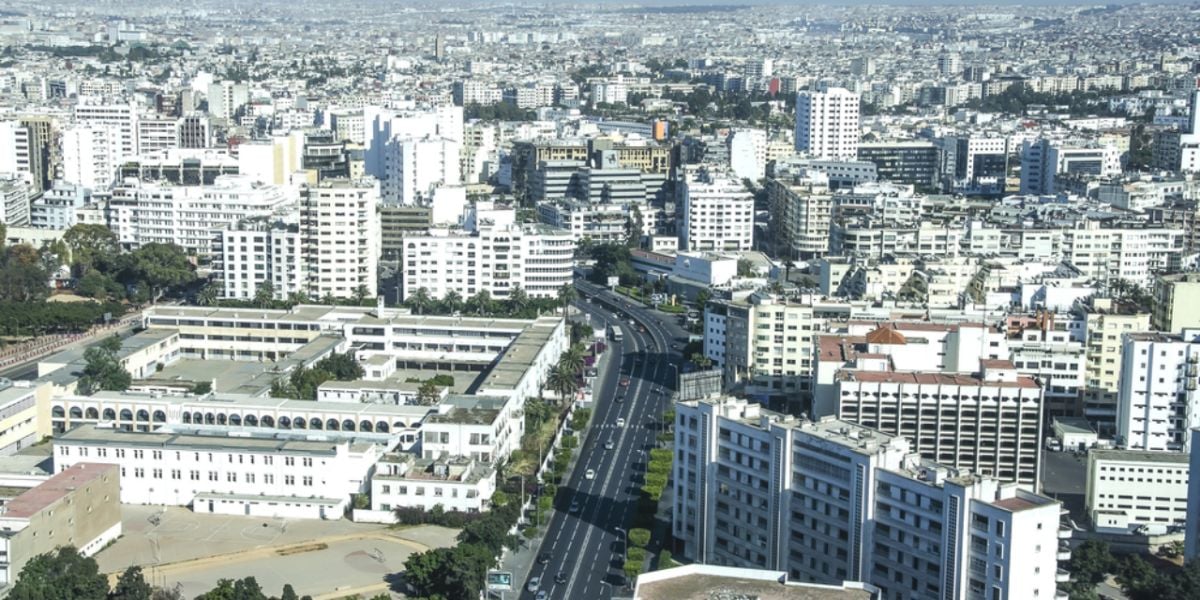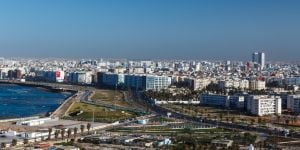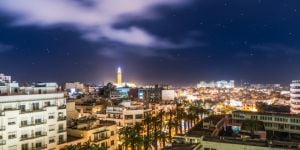
The real estate market in Morocco and particularly in Casablanca, is quite similar to the European market. Therefore, unless you want to buy a property in an agricultural zone, which will obviously not be the case in Casablanca, there is practically no other limit than your budget.
The different types of accommodation in Casablanca
Various types of property offers in Casablanca are structured on three stands, purely commercial, and do not tally to any local or international standard: economical, medium standing and high or very high standing. However, keep in mind that the issue of insulation, whether thermal or sound insulation, has never been a priority for property developers. In fact, appearance seems to matter more: marble and parquet usually indicate high standing, even if the insulation is poor. Similarly, heating systems are rare in Casablanca, and small mobile radiators are often used to warm up in winter.
Economical housing refers to apartments with a surface area not exceeding 80m², and the price of a new house rarely exceeds 250,000 dirhams. It is, therefore, a popular type of accommodation for the working class.
High or very high standard housing refers to apartments or villas (isolated, semi-detached, or in a compound) with equipment or finishes that are qualified as luxury. For example, air conditioning, marble or parquet flooring in a number of rooms (living rooms, bedrooms in particular), woodwork on the walls or ceiling, garden and swimming pool are some of the indicators. In fact, there is no quality/price ratio in Casablanca.
The Moroccan legislation regarding buying property
The Moroccan Constitution (Chapter 35) and the legislation in force in this country uphold the principle of freedom of ownership of a real estate by stipulating that: the law guarantees the right of ownership.
Concerning the ownership of real estate in Casablanca by foreigners and their need to own properties solely via purchase, there are several legal provisions governing such matters, depending on whether the property is located inside or outside the urban area, as determined by the following laws:
- Law No. 51.00 on rentals resulting in the acquisition of a real estate property;
- Law No 18.00 on the regime of community of property for built-up areas;
- Law No. 25.90 on real estate partition, residential complexes and property division;
- Law No. 18.95 in the form of an investment charter;
- Royal Decree of 19th Rajab 1333 A.H. corresponding to 02nd June 1915 A.D. determines the legislation applicable to preserved real estate;
- Royal Decree No. 1.59.171 of 12th May 1959 on real estate transactions conducted by a foreign country or corporate body governed by foreign law;
- Royal Decree No. 1.63.288 of 26th September 1963, relating to monitoring real estate transactions to be carried out by certain persons and concerning rural agricultural property;
- Royal Decree No. 1.63.345 of 13th November 1963 governing the acquisition of agricultural lands by foreigners and legal persons;
- Royal Decree No. 1.73.613 of 02nd March 1973 on reclaiming agricultural land from foreigners;
- Royal Decree in the form of Law No. 1.73.645 of 23rd April 1975 on the acquisition of agricultural or cultivable land outside urban areas, and restricting the right of acquisition to the government, public authorities and physical and legal persons deemed to be Moroccan.
- Royal Decree No. 1.63.289 dated 07th Jumada-I 1383 A.H. corresponding to 26th September 1963 A.D. stipulates the conditions under which the government recovers colonial lands.
As a matter of fact, a foreign national has the same opportunity as a Moroccan citizen in terms of owning a property on Moroccan urban territory, with the same terms and conditions. In addition, foreigners are expected to own agricultural or farming lands only for the purpose of carrying out non-agricultural investment projects, as per the provisions of Decree No. 2.04.683 of 29th December 2004. The acquisition of agricultural properties by foreigners with a view to carrying out agricultural projects is currently deemed impossible because the law of 23rd April 1975 is still in force and has not been amended, yet its requirements have only been reduced by the decree of 29th December 2004 with the aim of simplifying the legislative and regulatory frameworks for foreign investments.
Get well informed before buying property in Casablanca
It is necessary to obtain detailed information on local procedures in order to prepare your purchase. The official Embassy attachés, the regional Chambers of Commerce, the legal and financial advisors can provide you with reliable information. Once you have an overall view of the property, you need to determine your objective and the budget to be spent on it. Once the area and type of property have been defined, the best thing to do is to contact well-established real estate agents. With the real estate development in Morocco, it is easier and safer to turn to one of the many international companies on the spot.
Points to check before purchasing a property in Casablanca
Like any other real estate investment worldwide, you need to take your time in Casablanca and not rush in at first sight. If you opt for an old house, it is better to visit it during the day, but also at night. Consider making visits during the week and at weekends. Your objective is to check that all the required amenities are present (such as satisfactory thermal and sound insulation, proximity, etc.), as well as the sunlight, accessibility by public transport and any possible noise problems. Also, be sure to check the underground parking spaces. They must comply with the co-ownership regulations.
How to buy a real estate property in Casablanca
To buy a property in Casablanca, it is essential to visit first. If you buy off-plan, you should not only visit the showcase but also read and understand the contract in detail. As a foreigner, the contract must be explained to you by the promoter or an intermediary (usually a notary, but not always). Feel free to take your time before making any decision. The market is relatively slow at the moment, and customers are constantly being approached with more exciting offers. Some developers even offer a bonus to their customers - it could be a car or jewelry for the purchase of their apartments or villas.
The purchasing procedure legally goes through a notary for the signing of contracts. It is then the notary's responsibility to ensure that the land title (the only document proving ownership in Morocco) is obtained and that the various taxes related to the purchase are paid. Consider about 5% of the selling price plus insurance, taxes and fees. If you use an intermediary, also called "samsar" or a real estate agency, extra costs will definitely apply.
The Melkia
The Melkia is a legal document issued by an Adoul (i.e. notary). The latter is a sworn agent operating within the premises of the Courts. He/she is accredited by the Ministry of Justice and the issued document (i.e., the Melkia) is governed by the traditional Moroccan laws. This document has full legal validity. However, it does not provide the technical description of the property, such as location, surface area, size, and boundaries, which can sometimes give rise to disputes. The law enables the property to be registered and transformed into a land title. Upon filing a request with the land registry, the latter is responsible for specifying the technical and legal criteria in order to ensure the preservation of the right to ownership of the property and to avoid any disputes. The delivery of the land title is between six months and one year.
Taxation and administrative fees in Casablanca
Upon purchasing a property in Casablanca, you will have to pay the following:
- A registration fee at the mortgage services of the land registry, amounting to 4% of the net selling price for any real estate sale;
- Land registry fees amounting to 1.5% of the net selling price of the purchased property and 200 dirhams;
- If you obtain a bank loan, you will also have to pay 1.5% of the value of the bank mortgage.
- It is also important not to forget the notary's fees, which are generally between 0.5% and 1.5% of the net selling price with Value Added Tax at 20%, as well as the real estate agency expenses, which are around 2.5% of the selling price.
Once you become a property owner in Casablanca, you will face the three following taxes:
- Rental income tax, which applies if you rent out your property;
- Housing tax, if the property is used as your primary or secondary residence;
- Municipal services tax at a rate of 6.5% for all properties in the city suburbs, and a rate of 10.5% for buildings and facilities located in urban areas.
How to make the purchase price payment?
The payment of the purchase price must be made before a notary; it is very important to avoid any cash payments.
The deposit of the funds before the notary must be recorded on the contract of sale, and it should ideally include the following information:
- The sale price is deposited before the notary;
- If you are unable to register the sale contract with the land registry, you may choose to:
- either cancel the contract by providing for a resolute clause;
- or apply a penalty clause to oblige the vendor to remove the impediment to registration.
Real estate agents' vital role in Casablanca
If you do not reside in Casablanca, doing without a real estate agency is not feasible. The agency, and more precisely, its team of real estate agents, will act as intermediaries and will save you a lot of trouble. They can select properties that meet your needs and arrange for you to visit them during your stay. They will also guide you through all the administrative procedures. Indeed, you must never buy a property in Casablanca without first visiting it. This is true in all countries worldwide.
The importance of property registration in Casablanca
The main objective of property registration in Casablanca, as elsewhere in Morocco, is to ensure the publicity of the right of ownership and the deeds that come under it, such as easements, seizures, mortgages, leases, sale agreements, and, in general, everything that affects the right to ownership. The National Agency for Land Conservation shall issue to any party concerned a certificate of ownership which must contain all the details of the property, notably the name of the owner, the surface area, the location, and, above all, all the entries made on the land title.
There is no statutory limitation on ownership of registered property in Morocco, which is ironically one of the world's strongest defenders of property ownership. For instance, it is impossible, as in many countries, for a person to claim ownership of a property following thirty years of peaceful and regular occupation of it. Rather, the acquisition is achieved by registration of the property title with the land registry and not by possession.
Good to know:
You can still find untitled properties (i.e. not registered with the land registry) in Casablanca, and it is not recommended to buy these, even if the prices are more attractive. It is not uncommon to see cousins, uncles, aunts and other ancestral heirs coming to claim payment for their benefit or oppose the sale.
The benefits of living in Casablanca
First and foremost, Casablanca is a sunny city. There is sun all year round, at least 300 days a year, and a pleasant life far from the hectic pace of the big European and American cities. Besides, the living costs are lower than in France. The cost of living in Casablanca depends on your daily habits. Rents and basic necessities are generally more affordable than in the rest of the world.
Another positive point is that Morocco is an excellent place to start a business or to invest money. Major luxury real estate projects at affordable prices have been developed in the major cities of Morocco, including Casablanca. You can therefore make a rental investment or purchase a property to enjoy a peaceful life in Casablanca.
In addition, there is a real cultural adjustment. The people of Casablanca are hospitable and warm. You will feel at home and be greeted as you should be. The locals are very open and pleasant and like to offer their little tips to help new foreign arrivals settle in. The wonderful and delicious Moroccan cuisine is also part of this picture.
We do our best to provide accurate and up to date information. However, if you have noticed any inaccuracies in this article, please let us know in the comments section below.








